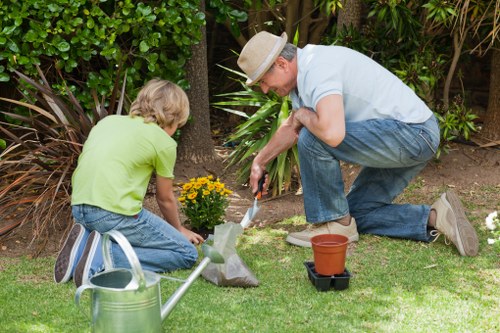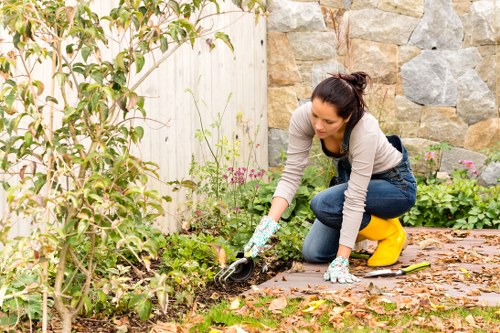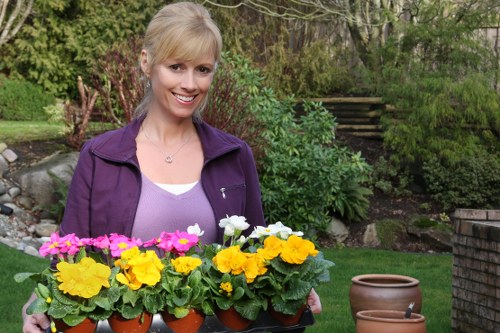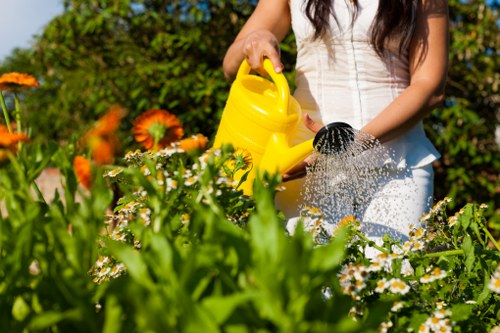Garden Maintenance in Shoreditch
Maintaining a beautiful garden in the heart of Shoreditch requires dedication, expertise, and a keen understanding of urban gardening challenges. Whether you’re a seasoned gardener or a novice looking to enhance your outdoor space, professional garden maintenance services in Shoreditch can transform your garden into a lush, vibrant sanctuary.
Shoreditch is renowned for its eclectic blend of modernity and tradition, making garden maintenance both a creative and technical endeavor. From managing limited space to selecting the right plants that thrive in urban environments, Shoreditch gardeners face unique challenges that require tailored solutions.
In this comprehensive guide, we will explore the essential aspects of garden maintenance in Shoreditch, offering valuable tips and insights to help you achieve a stunning garden all year round.

The Importance of Regular Garden Maintenance
Regular garden maintenance is crucial for ensuring the health and beauty of your outdoor space. It involves a variety of tasks, including pruning, weeding, watering, and fertilizing, all of which contribute to the overall well-being of your plants.
In Shoreditch, where space can be limited, maintaining a tidy and organized garden not only enhances aesthetic appeal but also maximizes the functionality of your outdoor area. Proper maintenance prevents the overgrowth of plants, reduces the risk of pests and diseases, and ensures that your garden remains a pleasant retreat.
Moreover, regular maintenance can increase the value of your property. A well-kept garden adds curb appeal and creates a welcoming atmosphere for guests and potential buyers alike.

Key Components of Garden Maintenance
Pruning and Trimming
Pruning and trimming are essential for shaping plants, promoting healthy growth, and preventing diseases. In Shoreditch gardens, where space is often at a premium, regular pruning helps maintain the desired size and form of your plants, ensuring they fit harmoniously within the limited area.
Proper pruning techniques vary depending on the type of plant. For instance, flowering shrubs may require different pruning methods compared to evergreen trees. Understanding these nuances is vital for effective garden maintenance.
Additionally, trimming hedges and topiaries adds a structured and polished look to your garden. It highlights the architectural elements of your outdoor space, creating visual interest and enhancing the overall design.

Weeding and Soil Care
Weeds compete with your plants for essential nutrients, water, and sunlight. Regular weeding is necessary to prevent unwanted plant growth and to maintain the integrity of your garden beds.
In Shoreditch’s urban environment, soil quality can be a challenge. Ensuring that your soil is rich in nutrients and well-drained is crucial for plant health. Incorporating organic matter, such as compost, can improve soil structure and fertility.
Mulching is another effective soil care practice. It helps retain moisture, suppresses weed growth, and regulates soil temperature, creating an optimal environment for your plants.

Watering and Irrigation
Proper watering is fundamental to garden health. Overwatering can lead to root rot and plant diseases, while underwatering can stress plants and inhibit growth. Striking the right balance is key.
- Assess Plant Needs: Different plants have varying water requirements. Understanding each plant’s needs ensures efficient watering practices.
- Implement Irrigation Systems: Automated irrigation systems can provide consistent watering, reducing the risk of human error and conserving water.
- Watering Schedule: Establishing a regular watering schedule, adjusted for seasonal changes, helps maintain optimal moisture levels in the soil.
In urban settings like Shoreditch, where water conservation is increasingly important, utilizing rainwater harvesting systems can be an eco-friendly and cost-effective solution.

Choosing the Right Plants for Shoreditch Gardens
The selection of plants plays a significant role in the success of your garden maintenance efforts. In Shoreditch, where the climate can be variable and urban pollution is a factor, choosing resilient and adaptable plants is essential.
Here are some tips for selecting the best plants for your Shoreditch garden:
- Consider Climate: Opt for plants that are suited to the local climate, ensuring they can thrive throughout the year.
- Low-Maintenance Varieties: Select plants that require minimal care, making garden maintenance more manageable.
- Space-Saving Plants: In limited spaces, choose compact or vertical-growing plants to maximize your garden’s potential.
- Pollution-Tolerant Species: Urban environments can expose plants to pollutants. Choose species that can withstand these conditions.
Popular choices for Shoreditch gardens include lavender, boxwood, and ornamental grasses, which offer both beauty and resilience.
Seasonal Garden Maintenance Tips
Spring
Spring is a critical time for garden maintenance, as it sets the stage for the growing season. Begin by clearing any debris accumulated over the winter, such as fallen leaves and dead plant material.
Prune any overgrown shrubs and prepare your soil by adding compost or organic fertilizers. Planting new flowers and vegetables during spring ensures they have ample time to establish before the summer heat.
Implementing an irrigation system at this stage can also help manage the increased water needs of your garden as temperatures rise.

Summer
Summer garden maintenance focuses on managing heat stress and ensuring plants receive adequate water. Regular weeding and mulching help retain soil moisture and reduce water evaporation.
Monitor your plants for signs of pests and diseases, addressing any issues promptly to prevent widespread damage. Pruning and deadheading flowers encourage continued blooming and healthy growth.
Additionally, providing shade for sensitive plants during the hottest parts of the day can protect them from sunburn and dehydration.
Autumn
Autumn is the time to prepare your garden for the colder months ahead. Begin by cleaning up fallen leaves and debris to prevent mold and fungal growth.
Prune trees and shrubs to remove any dead or diseased branches, promoting healthy growth in the spring. Planting bulbs in the fall ensures they bloom beautifully in the upcoming season.
Finally, protect perennials and other sensitive plants by adding a layer of mulch, which provides insulation against frost and temperature fluctuations.
Winter
Winter garden maintenance involves preparing your garden for dormancy. Focus on protecting plants from harsh weather by using protective coverings, such as burlap or frost cloths.
Inspect your garden tools and equipment, performing any necessary maintenance or repairs. This is also an excellent time to plan your garden layout and select new plants for the upcoming year.
While the garden may appear dormant, continued care ensures that your plants emerge healthy and vibrant in the spring.

Benefits of Professional Garden Maintenance Services
While some gardeners prefer to handle maintenance tasks themselves, hiring professional garden maintenance services in Shoreditch offers numerous advantages:
- Expertise: Professionals possess the knowledge and skills to address specific gardening challenges effectively.
- Time-Saving: Outsourcing maintenance tasks frees up your time, allowing you to enjoy your garden without the hassle of upkeep.
- Customized Care: Professionals tailor their services to meet the unique needs of your garden, ensuring optimal results.
- Access to Quality Tools: Professional gardeners have access to specialized equipment, enhancing the efficiency and quality of maintenance.
Investing in professional garden maintenance not only enhances the beauty of your outdoor space but also contributes to the long-term health and sustainability of your garden.
Eco-Friendly Garden Maintenance Practices
Adopting eco-friendly practices in garden maintenance is essential for promoting environmental sustainability and reducing your garden’s carbon footprint. Here are some strategies to incorporate green practices:
- Composting: Recycling organic waste through composting enriches your soil naturally, reducing the need for chemical fertilizers.
- Rainwater Harvesting: Collecting and utilizing rainwater conserves water resources and ensures sustainable irrigation.
- Native Plants: Choosing native plant species supports local biodiversity and requires less maintenance.
- Organic Pest Control: Utilizing natural pest control methods minimizes the use of harmful pesticides, protecting beneficial insects and the broader ecosystem.
Implementing these eco-friendly practices not only benefits the environment but also creates a healthier and more resilient garden.
Choosing the Right Garden Maintenance Service in Shoreditch
Selecting a reliable and experienced garden maintenance service in Shoreditch is crucial for achieving the desired results. Here are some tips to help you choose the best service provider:
- Experience and Expertise: Look for companies with a proven track record and knowledgeable staff.
- Comprehensive Services: Ensure the service offers a wide range of maintenance tasks to meet all your garden needs.
- Customer Reviews: Read testimonials and reviews to gauge the satisfaction of previous clients.
- Competitive Pricing: Compare pricing structures to find a service that offers value for money without compromising quality.
- Environmental Commitment: Choose services that prioritize sustainable and eco-friendly practices.
By carefully evaluating potential garden maintenance providers, you can select a service that aligns with your expectations and garden goals.
Conclusion
Effective garden maintenance in Shoreditch involves a combination of regular care, informed plant selection, and sustainable practices. Whether you manage your garden independently or enlist the help of professionals, prioritizing maintenance ensures a thriving and aesthetically pleasing outdoor space.
Embrace the beauty and tranquility of a well-maintained garden by implementing the strategies outlined in this guide. For those seeking expert assistance, contact us today to discuss how our garden maintenance services can transform your Shoreditch garden into a stunning oasis.
Book your service now and take the first step toward a beautiful, vibrant garden that enhances your living space and well-being.

